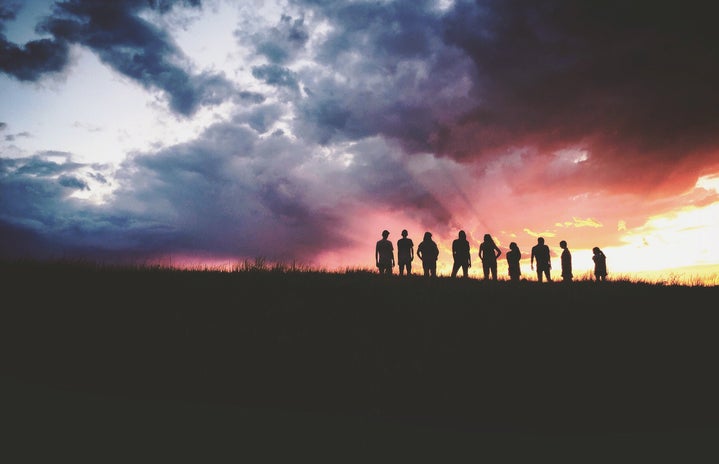Content Warning: This article contains themes of sexual assault and related mental health issues.
Whether you know it or not, you likely have a friend who has been sexually assaulted. How someone deals with their sexual assault can vary from person to person — there is no “right” or “wrong” way to react after something so horrible happens to you. However, there is a right and wrong way for you to react because it can have a huge impact on how your friend processes and heals from their assault.
Want to be there for them as best as you can? Read on for tips on what to (and what not to) say.
Instead of asking,”What happened?” ask, “Do you want to talk about it?”
This is not the time to get the “tea.” What happened to your friend is traumatic, and they very well may not want to talk about it. This is their story — they choose what they share and who they share that with. Respect that! The last thing they need is to feel pressured to tell you, or anyone, what happened to them.
Instead of saying,”You’ve seemed fine to me,” say, “You must have really been struggling with this.”
Just because you haven’t noticed your friend struggling doesn’t mean they haven’t been. Don’t put them in a position where they feel they have to prove to you that they have been having a hard time. Instead, simply take their word for it and recognize that the aftermath of a sexual assault is likely one with trauma, mental illness and hardships. Unless you’ve experienced this for yourself, you truly can’t imagine what your friend is going through.
Instead of saying,”I don’t want to get involved,” ask, “What can I do to help you?”
Friends are people who are there for you through everything, not just when it’s easy. If you turn your back, perhaps because sexual assault is an “uncomfortable” or “controversial” topic, then you aren’t a very good friend (I said what I said!). It’s not the time to think about your thoughts or feelings; it’s time to be strong and stand beside your friend because this is when they need you the most. Ask them if there is anything you can do to help — maybe you can do their laundry or dishes together, or have study dates to motivate them to do their homework. Even just checking up on them every so often will mean more to them than you know.
Instead of saying, “There are two sides to every story,” say, “I believe you.”
This is one of, if not the most important things you can say to your friend. Unlike other crimes, it’s very common for people to immediately second-guess incidents of sexual assault. In fact, your friend has probably already experienced some form of doubt from others about what’s happened to them. If a friend told you that they were injured and traumatized by a car crash, you wouldn’t call the other drivers to confirm the incident, would you? Treat your friend with the same concern, and ensure that they know their injuries and trauma are valid, even if they can’t be seen.
Instead of asking, “Why didn’t you do ___ instead?” say, “What happened to you isn’t your fault.”
This is probably an innocent question asked to understand your friend’s decisions during their assault, but it’s a question that I guarantee your friend is struggling enough with on their own. And, by asking this, you are insinuating that your friend brought on the assault by making a wrong choice. The reality is that, no matter what, NO ONE deserves to be sexually assaulted. Make sure your friend knows that they don’t deserve what happened to them and that is isn’t their fault.
Instead of saying, “It could have been worse,” say, “I can’t imagine going through you what you have.”
Let me be clear: saying anything along these lines is NOT helpful! It only minimizes your friend’s pain. Don’t compare their experience to someone else’s or what could have been. Focus on them by recognizing their struggle and expressing empathy. Even if you don’t think what happened is “that bad,” avoid expressing your personal feelings about the assault to your friend. Remember, this isn’t about you — it’s about them.
Instead of saying,”I don’t understand ___,” say, “I’m here for you.”
There is so much that you will not understand about your friend’s sexual assault, and you probably will never fully understand everything. But, truthfully, it’s not important for you to know every detail or comprehend every nuance. What IS important is the safety and well-being of your friend, so reiterate to them that they aren’t alone in this because they have you.
Instead of saying, “I’ll give you some space,” say, “Let’s hang out.”
Yes, sometimes giving someone space can help them resolve their issues on their own. However, survivors tend to experience symptoms of depression, anxiety, PTSD and even suicidal ideation, which can make them feel even more alone. Instead, ask your friend to hang out — maybe a chill movie night or lunch at their go-to spot. Something low-key where your friend can be distracted from their situation and feels comfortable and safe would be best. It’s possible that your friend will decline or flake, but the invite will let them know you care.
Instead of asking, “Why are you still hung up on this?” say, “It’s okay to not be okay.”
It’s not unusual for a sexual assault to have effects that last months or years, so your friend’s mood could fluctuate any which way between “okay” and “not okay” during that time. It might be frustrating for you to continually see your friend suffer when there’s not much you can do to take the pain away, and that’s understandably tough. But you shouldn’t pressure or guilt them into “getting over it,” they will likely just keep their feelings pent up as a result. Instead, let them know it’s okay — normal, actually — to not be okay. Healing is not a destination, it’s a journey, and the many ups and downs are just a part of it.
Instead of saying, “They are so terrible,” say, “You are so strong.”
Your friend does not want to hear about the person who assaulted them, good or bad. Instead, focus on them. Tell them what you love and admire about them. Make sure they know their importance and their worth, and that they are so much more than this thing that happened to them.
Although you can’t change what happened or shield your friend from all the negatives that come with the aftermath of a sexual assault, there are a few things you can do. Simply by believing them and being sensitive, attentive, understanding and supportive, you can make all the difference.
If your friend needs help beyond what you can give, you can call the free and confidential National Sexual Assault Hotline at 1-800-656-HOPE (4673) or visit their online hotline here.


